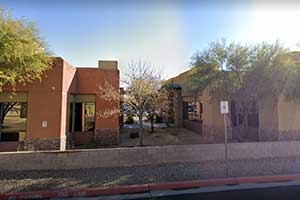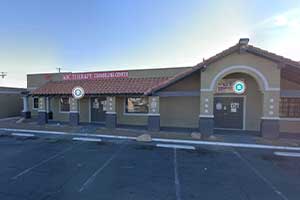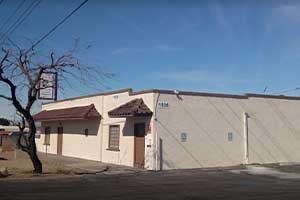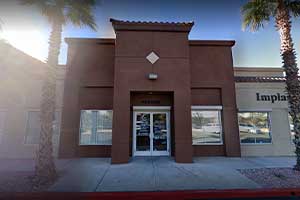Skip To Rehab Listing
Even so, for people struggling with substance abuse problems, Henderson can also offer solutions in the form of 28 addiction treatment facilities designed to help patients in their treatment.
Alcohol and Drug Rehab Approaches and Settings
Henderson area residents who have a problem with substance abuse have multiple rehab settings available to them, including the following: inpatient detox facilities, short term treatment centers, inpatient drug and alcohol rehab programs, long term addiction treatment centers, outpatient hospital programs.
These treatment centers make addiction treatment easy to access, with convenient locations and a number of varying rehabilitation modalities from which to choose, such as those listed here: dual diagnosis drug rehab, 12-step facilitation approach, individual psychotherapy, anger management, brief intervention approach, substance abuse counseling approach.
Special Programs for Substance Abuse Treatment
Addiction impacts every individual differently. In order to accommodate these differences and deliver a more customized treatment, addiction treatment centers in Henderson provide several special programs for [patients such as: substance abuse education, suicide prevention services, programs for the hearing impaired, self-help groups, co-occurring mental and substance abuse disorders, persons who have experienced sexual abuse.
Clients who believe they may need these special programs can discuss them with the rehab center to get help that is meant to maximize the likelihood of lasting recovery.
Rehab Payment Alternatives
Residents of Henderson come from differing financial situations, making it vital for rehabilitation centers to provide several payment alternatives that put rehab within financial reach. Clients can expect to get payment alternatives at local drug and alcohol rehab programs including the following: private medical insurance, cash or self-payment, medicare, medicaid, sliding fee scale, access to recovery (atr) voucher, state corrections or juvenile justice funds.
Despite a patient's financial situation, payment should not be an obstacle to rehab. Rehabilitation programs guide individuals through their payment alternatives and help them find a way to afford their treatment.
The goal of multiple rehab centers, approaches, programs, and payment alternatives is that treatment for drug and alcohol addiction is accessible for as many people who need it.
Commonly Asked Questions about Addiction and Treatment
How to face a drug abuser as a family?
Facing a family member who is a drug abuser is a challenging and emotional process. The ultimate goal should be to encourage the individual to seek help. Here are some steps that can be taken:
- Educate Yourself: Understanding addiction is key. It's a complex disease that affects both the brain and behavior. Learning about the nature of addiction, its causes, its effects, and the process of recovery will equip you with the necessary knowledge to approach your loved one.
- Create a Safe Space for Dialogue: Organize a time to sit down and discuss your concerns. The environment should be non-judgmental and non-confrontational to prevent the person from feeling attacked or defensive.
- Express Concern and Love: Start the conversation expressing your love and concern. Be honest about your feelings and observations, providing specific examples of behaviors that have worried you.
- Use "I" Statements: Instead of accusing or blaming, use "I" statements to express how you feel. For instance, instead of saying, "You're ruining your life," say, "I feel worried and scared when I see you harming yourself."
- Encourage Them to Seek Help: Encourage your loved one to seek professional help. Offer to assist them in finding resources, such as therapists, counselors, rehabilitation centers, or support groups.
- Consider an Intervention: If direct conversation doesn't work, consider planning a professional intervention. An intervention involves a gathering of close friends and family who express concern and urge the individual to get help, guided by a professional interventionist.
- Set Boundaries: It's important to protect your own well-being. This can involve setting boundaries regarding what behaviors you will not tolerate. Be firm about these boundaries and the consequences of crossing them.
- Seek Support for Yourself: Coping with a loved one's addiction can be emotionally taxing. Don't neglect your own needs. Seek support from therapists, counselors, or support groups designed for family members of people struggling with substance abuse.
Why do people abuse addictive substances?
People may abuse addictive substances for a variety of reasons, often involving a complex interplay of biological, psychological, and social factors. Here are some common reasons:
Biological Factors: Certain individuals may be genetically predisposed to addiction. This could involve inherited traits that affect the way substances interact with their brain or influence their susceptibility to mental health disorders, which can increase the risk of substance abuse.
Psychological Factors: Many people turn to addictive substances as a way to cope with mental health issues such as depression, anxiety, or post-traumatic stress disorder. Substance use may provide temporary relief from these conditions, though in the long term it often exacerbates them.
Social Factors: Peer pressure, especially among young people, can lead to substance abuse. If an individual is in an environment where drug or alcohol use is common, they may feel compelled to partake in order to fit in.
Environmental Factors: Stressful or traumatic environments can increase the risk of substance abuse. This can include living in poverty, experiencing abuse or neglect, or being exposed to violence.
Curiosity and Experimentation: Particularly among adolescents and young adults, the desire to try new experiences can lead to substance use.
Self-Medication: Some people use substances to self-medicate physical pain. For example, the opioid crisis has been fueled in part by individuals who initially used prescription opioids to manage pain and then developed an addiction.
Escapism: People may use substances to escape their reality, numb emotional pain, or simply to feel good. Addictive substances often provide a temporary sense of euphoria or relaxation, which can be enticing.
Co-occurring Disorders: Individuals with co-occurring mental health disorders are at a significantly higher risk of substance use disorders. This is because these individuals might use substances as a form of self-medication.
Top reasons that drug and alcohol abusers in recovery relapse?
Relapse is a common part of the recovery journey for many individuals struggling with substance abuse. It's important to note that a relapse doesn't mean treatment has failed; rather, it indicates that the treatment plan needs to be revisited or adjusted. Here are some of the top reasons why individuals in recovery might relapse:
- Stress: High levels of stress can trigger a return to substance use as a coping mechanism.
- Lack of Support System: A strong support system is crucial in maintaining sobriety. Lack of emotional support and understanding from friends and family can contribute to relapse.
- Triggers and Temptations: Being in environments or around people associated with past substance use can act as triggers, leading to a desire to use again.
- Unresolved Psychological Issues: Mental health conditions, such as depression, anxiety, or trauma, can lead to a relapse if they're not effectively treated.
- Overconfidence: Some individuals may become overconfident and believe they can control their substance use without professional help, leading to a relapse.
- Poor Self-Care: Neglecting physical health, skipping meals, lack of sleep, and not taking care of oneself in general can contribute to a relapse.
- Incomplete Treatment: Leaving a treatment program before it is completed can leave individuals ill-prepared to resist the urge to use substances.
- Not Having a Plan: If an individual does not have a clear plan for dealing with cravings or triggers, they are more likely to relapse when confronted with these challenges.
- Challenging Emotions: Negative emotions like anger, sadness, loneliness, and frustration can sometimes lead to a desire to return to substance use as a way to escape.
- Celebrations or Positive Events: Surprisingly, positive events or celebrations can also trigger a relapse. The association of substance use with celebration or reward can lead to the temptation to use.













